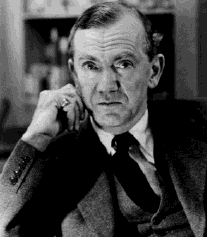| Graham Greene
on writing:
In most of my books, however
well I might know the scene, there is one lay figure who
obstinately refuses to live, who is there only for the
sake of the story — Krogh in England Made Me,
Smythe in The End of the Affair, Wilson in The
Heart of the Matter, the journalist Parkinson in A
Burnt-Out Case. The sad truth is that a story hasn't
got room for more than a limited number of created
characters. One more successful creation and like an
overloaded boat the story lists. Excitement is simple: excitement
is a situation, a single event. It mustn't be wrapped up
in thoughts, similes, metaphors. A simile is a form of
reflection, but excitement is of the moment when there is
no time to reflect. Action can only be expressed by a
subject, a verb and an object, perhaps a rhythm —
little else. Even an adjective slows the pace or
tranquilizes the nerve. The main character in a novel
must necessarily have some kinship to the author, they
come out of his body as a child comes from the womb, then
the umbilical cord is cut, and they grow into
independence. The more the author knows of his own
character the more he can distance himself from his
invented characters and the more room they have to grow
in. There are, I think, a few points
of academic interest in Stamboul Train. The
young dancer Coral Musker had surely appeared at the
Theatre Royal in Nottwich, like Anne, a character in a
later book, A Gun for Sale, and I can detect in
both books the influence of my early passion for
playwrighting which has never quite died. In those days I
thought in terms of a key scene — I would even chart
its position on a sheet of paper before I began to write.
"Chapter 3. So-and-so comes alive." Often these
scenes consisted of isolating two characters —
hiding in a railway shed in Stamboul Train, in
an empty house in A Gun for Sale. It was as
though I wanted to escape from the vast liquidity of the
novel and to play out the most important situation on a
narrow stage where I could direct every movement of my
characters. A scene like that halts the progress of the
novel with dramatic empahsis just as in a film a close-up
makes the moving picture momentarily pause. I can watch
myself following this method even in so late a book as The
Comedians. I had long abandoned that sheet of paper
— otherwise perhaps I would have written on it,
"Scene: Cemetery. Jones and Brown come alive."
It might even be said that I reached the logical climax
of the method in The Honorary Consul where
almost the whole story is contained in the hut in which
the kidnappers have hidden their victim. T.S. Eliot and Herbert Read were the two great
figures of my young manhood (they meant more to me than
Joyce, and as for Pound he was somehow always a very long
way off – an explorer of whose survival at any
particular moment one could never be quite certain.) I
had not the courage to approach Eliot or Read myself.
What interest could they feel for a young and
unsuccessful novelist? So it must have been chance which
led to my first encounter with Read, and I was proud,
surprised and a little daunted when I received a letter
from him inviting me to dinner. "Eliot is coming,
but no one else, and everything very informal." To
me it was a little like receiving an invitation from
Coleridge — "Wordsworth is coming, but no one
else."…(At that dinner with Eliot we had talked
of Arsene Lupin — a subject which always helped
Eliot to unbutton — perhaps for a moment it made him
feel safe from ladies going to and fro talking of
Michelangelo.) © Melody Yiu Images and quoted text on this website may be protected by U.S. and international copyright laws. They are presented here for academic interest and personal entertainment. No distribution, reporduction, re-transmission or other rights are given or implied by their appearance. If you have any copyright concerns, please notify me. |
 In most of my
novels I can remember passages, even chapters, which gave
me at the time I wrote them a sense of satisfaction
— 'this at least has come off.' So I felt, however
mistakenly, with the trial scene in The Man Within,
and later with Querry's voyage in a Burnt-Out Case,
with the three-cornered love scene in The Quiet
American, the chess game in Our Man in Havana,
the prison dialogue in The Power and the Glory,
the intrusion of Miss Paterson in the Boulogne chapters
of Travels with My Aunt — I don't think a
single book of mine failed to give me at least once a
momentary illusion of success except The Name of the
Action.
In most of my
novels I can remember passages, even chapters, which gave
me at the time I wrote them a sense of satisfaction
— 'this at least has come off.' So I felt, however
mistakenly, with the trial scene in The Man Within,
and later with Querry's voyage in a Burnt-Out Case,
with the three-cornered love scene in The Quiet
American, the chess game in Our Man in Havana,
the prison dialogue in The Power and the Glory,
the intrusion of Miss Paterson in the Boulogne chapters
of Travels with My Aunt — I don't think a
single book of mine failed to give me at least once a
momentary illusion of success except The Name of the
Action.